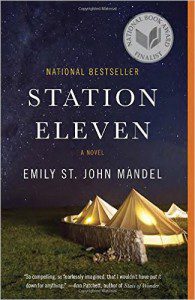Last year, John Wilson of Books & Culture praised Emily St. John Mandel’s post-apocalyptic novel Station Eleven. Over the years, B&C has placed several splendid novels on my radar screen, including Mischa Berlinski’s Fieldwork (Berlinski’s second novel will appear this coming March).
 Station Eleven did not disappoint. Mandel’s is an artfully crafted narrative, weaving together several stories that finally cohere by the end of the book.
Station Eleven did not disappoint. Mandel’s is an artfully crafted narrative, weaving together several stories that finally cohere by the end of the book.
The “Georgia Flu” wipes out human civilization, killing 99.9% of the world’s human population, leaving behind small, scattered settlements and a small number of “ferals.” No electricity, no internet, no antibiotics, no plane or car travel. Life quickly becomes far more nasty, brutish, and short.
Station Eleven narrates the post-collapse lives of several individuals, including Kirsten Raymonde, who belongs to the Traveling Symphony, a band of musicians and thespians who perform Shakespeare and fend off bandits.
The novel also moves backward in time, slowly bringing together the lives of individuals who have known Arthur Leander, an actor who dies of a heart attack while performing King Lear on the eve of the collapse. One of Arthur’s several ex-wives is a comic book artist who has created Station Eleven, a story of humans who have fled earth just prior to its conquest by aliens. Station Eleven is a human-made planet of sorts, where people live in perpetual twilight. The space-bound civilization is plagued by “the Underworld,” inhabited by disaffected individuals who want to return to earth under any circumstances. The Underworld’s denizens snatch the residents of Station Eleven away from safety when they least suspect it.
The post-collapse earth inhabited by Kirsten Raymonde has its own Underworld, a marauding army led by a prophet, the son of Arthur Leander by another wife. In the immediate aftermath of the collapse, that wife teaches her son Tyler that “everything happens for a reason,” and he begins reading the Book of Revelation (and the Station Eleven comics). He becomes convinced that God has purified the earth of wickedness and has saved a remnant of humanity (“the light”). As the Prophet, Tyler takes multiple wives, and his followers pray on settlements to obtain more guns, ammunition, and women. Like the men and women of the Underworld, the Prophet’s band silently tracks its targets, killing them or capturing them unaware.
Mandel spends little time on the epidemic itself, but her portrait of a post-apocalyptic earth is both haunting and heartwarming. Kirsten has two knife tattoos for the two men she was forced to kill. Life is dangerous outside of the settlements. At the same time, North America’s few remaining residents love Shakespeare.
The role of religion in Station Eleven is also haunting. Outside of the Prophet, there’s no overt sign of Christianity’s survival after the collapse. It is a truly post-Christian landscape, except for the polygamist, violent, unmerciful Tyler and his followers. One of the book’s protagonists — in a small airport miraculously spared by the Georgia Flu — must accept and encourage the quarantine of a late-arriving plane with infected passengers.
Station Eleven, though, is a novel of beauty and hope. The survivors in the airport do not share the religious faith of Tyler and his mother, but they hold all things in common. And in the worst of circumstances, one youthful follower shoots the prophet as he prepares to execute Kirsten. He knows nothing other than the prophet’s world, yet he knows that this is not how humans should live. Along the way, Mandel points out much of the meaninglessness of contemporary civilization (why can’t we use electronic devices during takeoff and landing?) but also reminds us of its typically overlooked beauty. And in the end, Kirsten sees a grid of lights from a distant settlement, where some twenty years after the collapse some survivors have resuscitated electricity.
Station Eleven is almost enough to make one buy ten cases of bottled water and considerable firepower (in one of the few humorous asides in the book, she — Mandel is Canadian — mentions the danger posed by the massive quantity of guns in the post-collapse American South). Mandel, I think, would not encourage her readers to become survivalists. After all, in a line borrowed from Star Trek, one of the novel’s themes is that “survival is insufficient.” Far better to appreciate the beauty inherent even amid the banalities of modern civilization.












